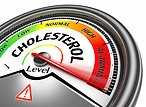 Elevated serum cholesterol is an established risk factor influencing cardiovascular health. Total cholesterol, low-density lipoproteins (LDL), high-density lipoproteins (HDL), and triglycerides all influence risk. Guidelines from the U.S. National Cholesterol Education Program identify LDL cholesterol levels as the most important of these factors, suggesting that an optimal level of LDL should be less than 100 mg/dL.
Elevated serum cholesterol is an established risk factor influencing cardiovascular health. Total cholesterol, low-density lipoproteins (LDL), high-density lipoproteins (HDL), and triglycerides all influence risk. Guidelines from the U.S. National Cholesterol Education Program identify LDL cholesterol levels as the most important of these factors, suggesting that an optimal level of LDL should be less than 100 mg/dL.
Menopause and cholesterol
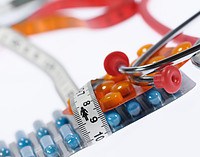 During menopause, cholesterol levels can often increase as estrogen levels decrease. This is largely due to a decrease in the production of HDL cholesterol, which has an inverse relationship with menopause. Estrogen therapy might effectively lower cholesterol levels and elevate HDL cholesterol, yet it may not be a viable option for all individuals. Luckily, you can take several natural approaches to reduce the risk of high cholesterol and keep your levels at their best.
During menopause, cholesterol levels can often increase as estrogen levels decrease. This is largely due to a decrease in the production of HDL cholesterol, which has an inverse relationship with menopause. Estrogen therapy might effectively lower cholesterol levels and elevate HDL cholesterol, yet it may not be a viable option for all individuals. Luckily, you can take several natural approaches to reduce the risk of high cholesterol and keep your levels at their best.
The most important step is nutrition. 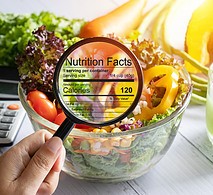
Eating a diet rich in fruits, vegetables, whole grains, and lean proteins can help lower cholesterol and maintain cardiovascular health. Additionally, limiting saturated fat intake is key; opt for healthier fats like olive oil and avocado instead. To reduce your cholesterol levels, strive for a minimum of three servings of heart-healthy foods like oats and oranges daily. Supplements like fish oil, garlic, and red yeast rice can also be beneficial. Maintaining an exercise regimen is just as important as dieting regarding cholesterol control.
Regular physical activity helps burn cholesterol-raising saturated fats and increases the HDL cholesterol in your body. – try to get 150 minutes of exercise each week (30 minutes five times a week).
So get out there and keep your cholesterol levels low!
Finally, don’t forget to monitor cholesterol levels. Have your cholesterol checked regularly by a professional; You may need more than just a lifestyle change. 
Cholesterol-lowering medications are available if lifestyle changes aren’t enough. Statins are the most commonly prescribed cholesterol-lowering drugs; they block cholesterol absorption in the intestines and stimulate the liver to remove cholesterol from the bloodstream. Talk to your healthcare provider about which cholesterol-lowering medication might be right for you. By making small but meaningful changes to your lifestyle and diet, you can keep cholesterol levels in check and reduce your risk of cardiovascular disease.
Remember – healthy cholesterol is within reach!
Let’s uncover the truth about dietary supplements that have been proven to lower cholesterol levels.
Red yeast rice (Monascus purpureus)

1200-2400 mg, once per day, minimum 8 to 12 weeks
- Patients with abnormally high levels of fats in the blood (known as dyslipidemia) who were unable to continue statin ( a medication used to lower cholesterol) use due to myalgia, when placed on Red yeast rice, experienced decreased low-density lipoprotein (LDL) cholesterol by 43 mg/dL (1.11 mmol/L) at 12 weeks and 0.90 mmol/L at 24 weeks when taking 1800 mg twice daily, compared to initial levels, and control group with placebo (https://pubmed.ncbi.nlm.nih.gov/19528562/ )
- A meta-analysis showed a weighted mean difference in total cholesterol levels decreased by 0.91 mmol/L, triglycerides by 0.41 mmol/L, and LDL cholesterol by 0.73 mmol/L as well as increased high-density lipoprotein (HDL) by 0.15 mmol/L (https://pubmed.ncbi.nlm.nih.gov/17302963/)
- Monocolin K-rich, red yeast rice, was found to be more effective in lowering total cholesterol and LDL cholesterol when compared to GABA-rich red yeast rice in patients with hyperlipidemia ( https://pubmed.ncbi.nlm.nih.gov/30871361/)
- A meta-analysis showed that in a number of small trials, red yeast rice was found to have similar effects to statins in ability to improve cholesterol profile (https://pubmed.ncbi.nlm.nih.gov/26956355/)
Coenzyme Q10 (CoQ10)
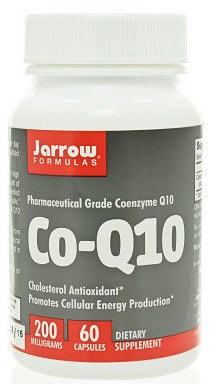
200 mg, once per day, minimum 3 months
- Systematic review and meta-analysis of seven trials found supplementation effective in reducing triglyceride levels observed with consistent supplementation (https://pubmed.ncbi.nlm.nih.gov/25913756/)
- Meta-analysis of eight trials found a total cholesterol decrease of 1.07 (standardized mean difference) and HDL increased by 1.30 (standardized mean difference) in patients with coronary artery disease (https://pubmed.ncbi.nlm.nih.gov/30296936/)
- Patients with dyslipidemia supplemented with 120 mg of CoQ10 for 24 weeks experienced a decrease in blood pressure, serum triglyceride, and LDL cholesterol, as well as an increase in total antioxidant diastolic blood pressure and ApoA-I, demonstrating an overall decrease in cardiovascular disease risk factors when 120 mg per day (https://pubmed.ncbi.nlm.nih.gov/29454678/)
- After supplementing with 200 mg for 1 week, an increase in serum CoQ10 correlated with improved HDL cholesterol as well as inhibition of monocyte-derived macrophage foam cell formation, suggesting an overall improvement in cardiovascular health (https://pubmed.ncbi.nlm.nih.gov/26081100/)
Garlic (Allium sativum)
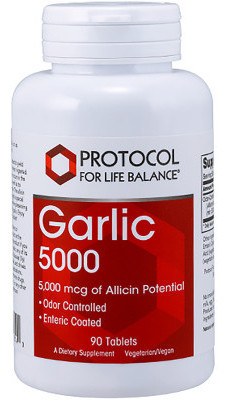
400-600 mg, once per day, minimum 12 weeks
- An increase in HDL (high-density lipoprotein) in addition to a decrease in alipoprotein B and an increase in the LDL/alipoprotein B ratio was observed after supplementation with 6 g/day aged black garlic for 12 weeks (https://pubmed.ncbi.nlm.nih.gov/24976429/ )
- Supplementation decreased total cholesterol by 11.5%, decreased LDL by 13.8%, and increased HDL cholesterol by 11.5% in men aged 35-70 with mild hypocholesterolemia when given 600 mg per day (https://pubmed.ncbi.nlm.nih.gov/19060427/)
- Meta-analysis of 14 papers found hyperlipidemia improved, as demonstrated by n improvement in total cholesterol (https://pubmed.ncbi.nlm.nih.gov/29718835/)
- Inflammation decreased as demonstrated by a decrease in arterial stiffness index, high-sensitivity C-reactive protein, LDL cholesterol, and total antioxidant status in obese patients compared to placebo when given 400 mg per day (https://pubmed.ncbi.nlm.nih.gov/29604599/)
- A meta-analysis showed that when the use of garlic supplementation was continued for at least 2 months, a decrease in total serum cholesterol by 8% and decreased risk of a coronary event by 38% was observed in people 50 years of age (https://pubmed.ncbi.nlm.nih.gov/23590705/)
- Garlic supplementation in patients with hypertension decreased blood pressure, helped to decrease slightly elevated cholesterol, and increased immune function, as shown by a decrease in blood pressure and improvement in blood lipids when treated for a minimum of 2 weeks (https://pubmed.ncbi.nlm.nih.gov/26764326/)
L-Carnitine
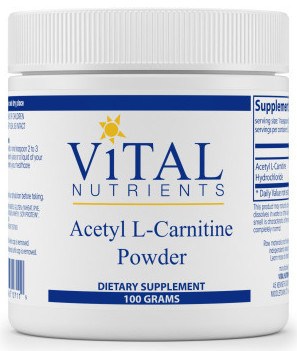
2 g per day, minimum of 12 weeks
- Patients with hyperlipidemia demonstrated a decrease in lipoprotein (a) by 19.4% compared to 6.7% in the placebo group when supplemented with 2 g per day of L-carnitine for 12 weeks; similar decreases in total cholesterol, LDL, apolipoprotein (b), and triacylglycerols (https://pubmed.ncbi.nlm.nih.gov/27914033/)
- Decreased oxidation of LDL cholesterol occurred as demonstrated by a decrease in oxidized LDL levels by 15.1 U/L compared to 3.0 U/L in placebo, and LDL cholesterol by 0.45 mmol/L compared to 0.16 mmol/L in placebo in patients with type 2 diabetes when given 2 g per day (https://pubmed.ncbi.nlm.nih.gov/19056606/)
- Decreases in plasma lipoprotein (a) were observed in hypercholesterolemic patients newly diagnosed with type 2 diabetes when supplemented with 1g twice per day of L-carnitine compared to placebo (https://pubmed.ncbi.nlm.nih.gov/12867219/)
- 77.8% of patients with elevated Lp(a) experienced a reduction in lipoprotein (a) when supplemented compared to 38.9% in placebo; patients with a higher elevation at baseline experienced more significant decreases in Lp(a) with 2 g per day supplementation (https://pubmed.ncbi.nlm.nih.gov/11213533/)
Omega-3 fatty acids
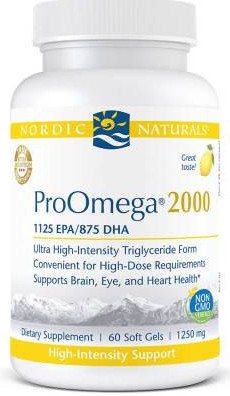 2-4 g, total per day, minimum 3 months (Dose varies greatly based on EPA/DHA content)
2-4 g, total per day, minimum 3 months (Dose varies greatly based on EPA/DHA content)
- By reducing VLDL, both EPA and DHA, when administered independently, resulted in reduced fasting circulating triglyceride levels (https://pubmed.ncbi.nlm.nih.gov/28797250/)
- A systematic review of six studies found supplementation of EPA or DHA greater than 2 g per day (with greater than or equal to 90% purity) was found to have a triglyceride concentration lowering effect, with DHA having a more significant impact at decreasing triglyceride concentration (https://pubmed.ncbi.nlm.nih.gov/29425187/)
- Systematic review and meta-analysis found when given omega-3 fatty acids during statin therapy, an improvement in decreasing total cholesterol was demonstrated (https://pubmed.ncbi.nlm.nih.gov/30558030/)
- Fasting serum triglyceride decreased by 25.9%, 25.5%, and 30.9% in groups supplemented with 2, 3, and 4 grams of omega-3 fatty acids, respectively, in patients with severe hypertriglyceridemia (https://pubmed.ncbi.nlm.nih.gov/24528690/)
- When given in addition to rosuvastatin, 4 g per day of omega 3 fatty acids decreased triglyceride levels by 26.3% (11.4% in placebo) and non-HDL-C by 10.7% (2.2% in placebo), with combined supplementation showing the greatest impact in patients with residual hypertriglyceridemia (https://pubmed.ncbi.nlm.nih.gov/29223557/)
An expert in nutrition wrote this article. Please consult a medical doctor before taking any dietary or lifestyle changes.

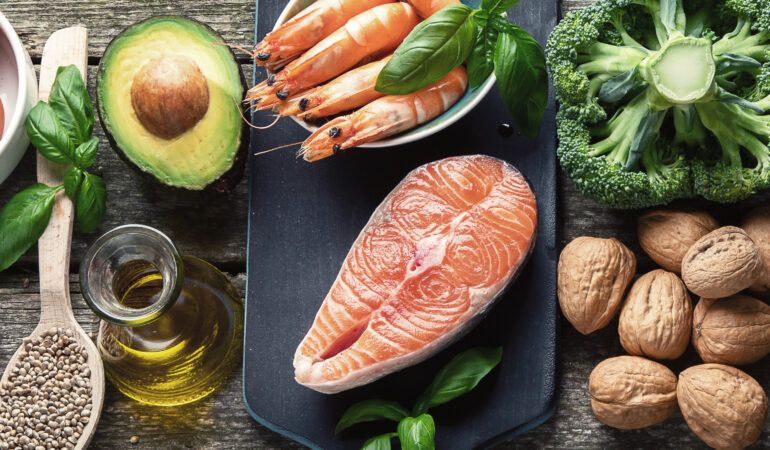



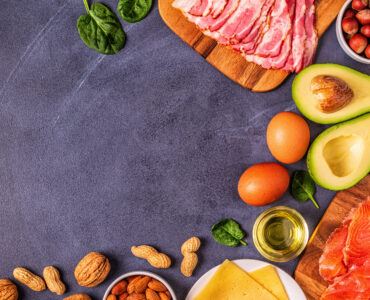
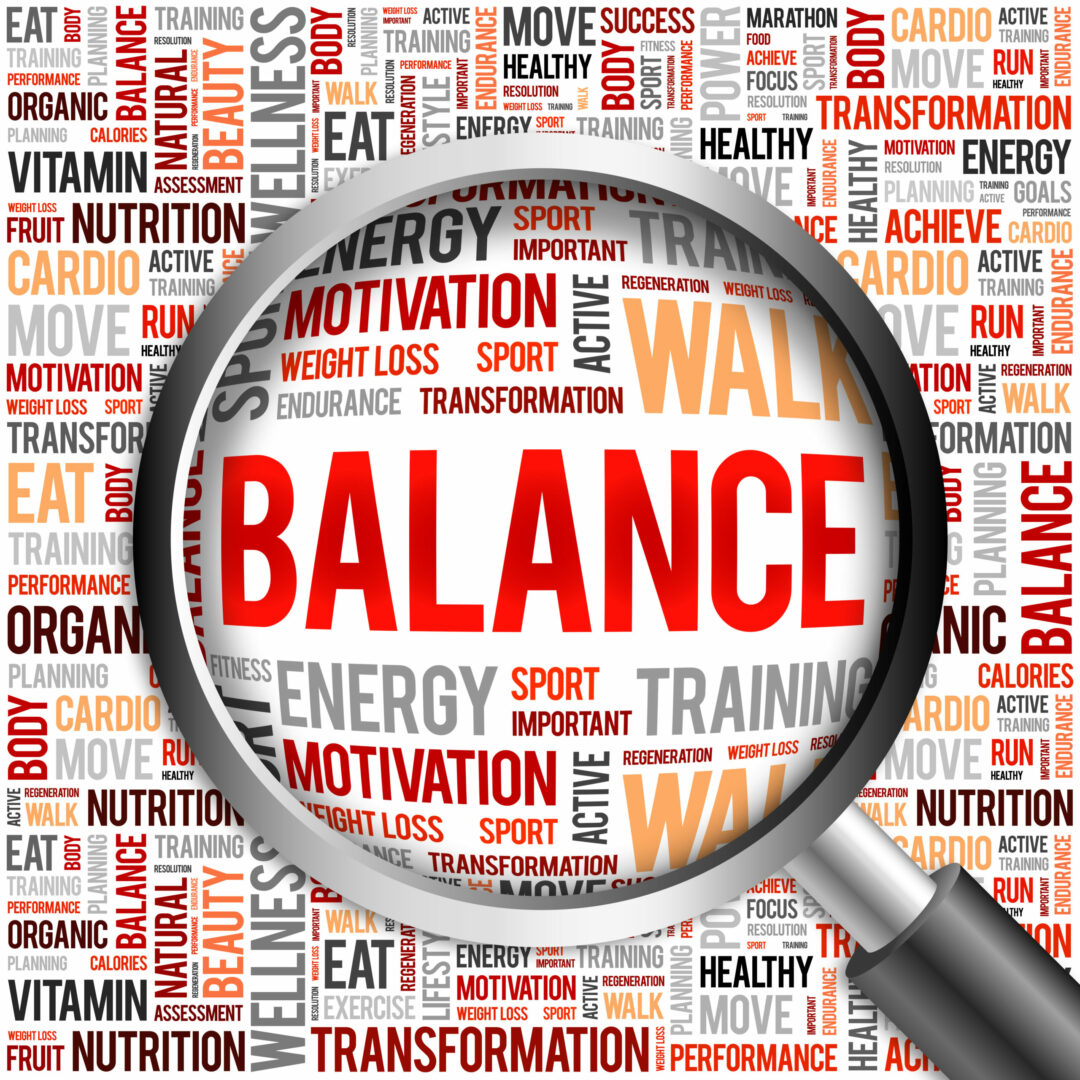

Your article on menopause supplements is very helpful. When my mom entered this stage of her life, she used to suffer a lot because she has arthritis. However, I recommended some of the supplements not knowing that they would actually help her dealing with her menopause! I told her about Omega 3s, and Co-enzyme Q10. Now I just learnt about L-carnitine. Thanks for this informative piece.
Thank you for your kind words, angelce903! We’re glad our Menopause: Supplements for a Healthy Cholesterol Balance article was helpful to you. Our team is passionate about helping people live their healthiest lives, and we’re glad that our content was able to do just that. Thank you for reading and sharing!
This is a very interesting topic on cholesterol and health, but I did find it very scientific and difficult to follow for anybody that it not medically trained.
This is just one example and I quote from the post “Decreased oxidation of LDL cholesterol occurred as demonstrated by a decrease in oxidized LDL levels by 15.1 U/L compared to 3.0 U/L in placebo, and LDL cholesterol by 0.45 mmol/L compared to 0.16 mmol/L in placebo in patients with type 2 diabetes when given 2 g per day”.
If your target audience is medical professionals, then it might be good, but if the target audience is the general public, you need to write in everyday language that can be by understood by them. Thank you.
Thank you for your honest feedback, LineCowley. We’re sorry to hear that the language in our post was too scientific and difficult to follow. Our goal is always to write in a way that is easy for anyone to understand, regardless of their level of expertise or training.
We appreciate your taking the time to provide your feedback and will use it to help us improve our content in the future. Thank you for reading Menopause: Supplements for a Healthy Cholesterol Balance.
Cholesterol is nothing to play with, I have been taking cholesterol prescription meds for a few years now and I still have high levels of cholesterol. I was looking for new natural remedies to help manage cholesterol after menopause, and that is how I found your research. Am going to my primary physician today, and going to ask if its okay to take the CO-Q10 supplement you talked about to help manage.
I appreciate your interest in our Menopause: Supplements for a Healthy Lipid Balance? report, Jannette. I’m glad you’re looking for new ways to manage your cholesterol after menopause.
Our report discusses the potential benefits of taking CO-Q10 supplements to help manage cholesterol levels. I’m happy to hear your primary physician is open to discussing this with you.
Thank you again for your interest in our report, and I hope you find the information helpful. If you have any other questions, please let us know. We’re here to help!
As much as I do not want to admit it, I am on my way to that stage, lol. That’s reality! Another reality is that as we grow older, our bodies become susceptible to all kinds of health problems. This is why older people need to be conscious of what they eat and engage in regular physical activities.
I used to work in a medical facility as a laboratory scientist and part of my job was to perform tests for blood sugar and cholesterol levels. You are absolutely right; it is crucial that LDL levels should not exceed 100 mg/dL. This is what we call bad cholesterol and tends to increase with age.
Indeed, dietary supplements are needed to regulate LDL levels among menopaused women, in addition to a healthy lifestyle. I do not remember the last time I did a lipid profile test but I believe it’s time to pay my doctor a visit. I am no longer working in a medical facility and so I am not able to do my regular blood tests.
Thanks for the reminder, Dr. Gala.
Hi, Alice! Thank you so much for stopping by and reading my article. I appreciate your comments and added contributions to this topic. I hope you checked on your cholesterol and everything is fine.